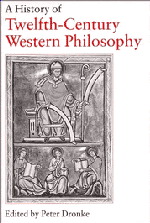Book contents
- Frontmatter
- Contents
- Preface
- Contributors
- List of abbreviations
- Introduction
- I Background
- II New Perspectives
- III Innovators
- IV The Entry of the ‘New’ Aristotle
- 15 Aristotelian thought in Salerno
- 16 David of Dinant and the beginnings of Aristotelianism in Paris
- Bio-bibliographies
- General Bibliography
- Index of Manuscripts
- General Index
16 - David of Dinant and the beginnings of Aristotelianism in Paris
Published online by Cambridge University Press: 01 June 2011
- Frontmatter
- Contents
- Preface
- Contributors
- List of abbreviations
- Introduction
- I Background
- II New Perspectives
- III Innovators
- IV The Entry of the ‘New’ Aristotle
- 15 Aristotelian thought in Salerno
- 16 David of Dinant and the beginnings of Aristotelianism in Paris
- Bio-bibliographies
- General Bibliography
- Index of Manuscripts
- General Index
Summary
The Parisian Synod of 1210, presided over by Peter of Corbeil, the Archbishop of Sens, and by Peter of Nemours, the Bishop of Paris, with the participation of the bishops of the ecclesiastical province, was concerned with three different problems: the Amalrician heresy, the appearance in Paris of Aristotelian texts translated by David of Dinant, and, finally, the order that the ‘theological books’ written in the vernacular (in Romano) should be handed in to the bishops of the individual dioceses. Of these three matters, the most serious was that of the persistence and wider expansion of the Amalrician movement after the death of Amalric of Bène in 1206. The Synod ordered that Amalric's body should be removed from the graveyard and cast on unhallowed ground. As for the presence in Paris of Aristotelian texts, the Synod decreed thus:
David of Dinant's notebooks (Quaternuli) are to be handed in before Christmas to the Bishop of Paris and burnt; and no lectures are to be held in Paris either publicly or privately using Aristotle's books on natural philosophy or the commentaries, and we forbid all this under pain of excommunication. If from the birthday of our Lord onwards, anyone is found to be in possession of Master David's Quaternuli, he shall thereafter be considered a heretic.
- Type
- Chapter
- Information
- A History of Twelfth-Century Western Philosophy , pp. 429 - 442Publisher: Cambridge University PressPrint publication year: 1988
- 6
- Cited by



